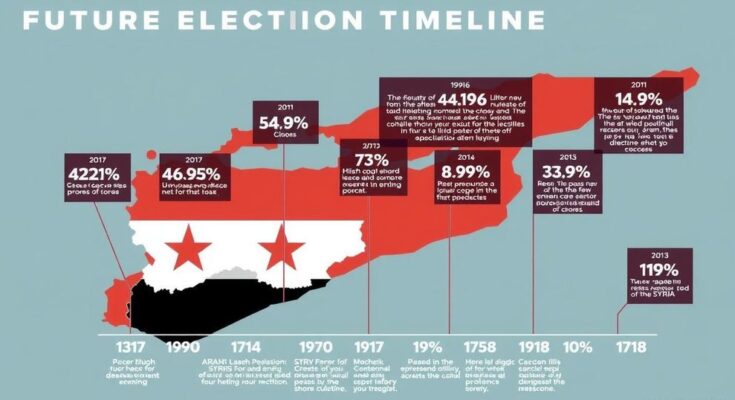Ahmed al-Sharaa, Syria’s new leader, announced that elections may take up to four years, primarily due to the need for a new census and constitution. This comes after the overthrow of Bashar al-Assad. Al-Sharaa aims to promote stability in Syria and has expressed hopes for improved U.S.-Syria relations under the incoming Trump administration.
Ahmed al-Sharaa, the de facto leader of Syria, has indicated that holding elections in the war-torn nation could require up to four years. This announcement marks the first time he has addressed an electoral timeline since his faction, Hayat Tahrir al-Sham (HTS), helped to remove Bashar al-Assad from power three weeks ago. According to al-Sharaa, a new census must be conducted to ascertain the number of eligible voters before meaningful elections can be realized. He mentioned that drafting a new constitution might take as long as three years and that significant changes in the country could be expected within a year, especially with plans for national dialogue to dissolve HTS as a military and political entity.
In addition to addressing electoral matters, al-Sharaa asserted that Syria aims to be a stable neighbor, stating, “Syria will not be a source of disturbance to anyone.” His comments signal efforts by the new government in Damascus to foster positive relations with neighboring countries. Al-Sharaa further underscored the strategic partnership with Russia, a key ally and military supporter during the Syrian civil war, while also expressing hope that the incoming administration of U.S. President-elect Donald Trump would consider lifting sanctions against Syria. This development comes in the wake of recent U.S. diplomatic visits to Damascus, which have reportedly characterized al-Sharaa as a pragmatic leader.
The context surrounding Ahmed al-Sharaa’s declaration stems from the recent political upheaval in Syria following the ousting of longtime ruler Bashar al-Assad. Al-Sharaa, as the leader of HTS, reflects a shift in power dynamics within the country. The need for a proper electoral framework highlights the complexities that exist in a post-conflict nation like Syria, where socio-political stability remains a significant concern. Furthermore, the nuanced relationship with Russia and potential shifts in U.S. foreign policy under the Trump administration could impact Syria’s political landscape moving forward. As the international community looks on, Syria’s internal restructuring will be closely monitored for signs of lasting stability and peace.
In conclusion, Ahmed al-Sharaa’s timeline for elections in Syria underscores the complexities of governance in a nation recovering from civil strife. The proposed duration of up to four years reflects the essential tasks that must be completed before a credible electoral process can take place, including a comprehensive census and constitutional drafting. His commitments to fostering stability and collaboration with international allies, particularly Russia, signal a strategy aimed at reestablishing Syria’s position in the regional context, while potential changes in U.S. policy may also influence these efforts.
Original Source: www.aljazeera.com




